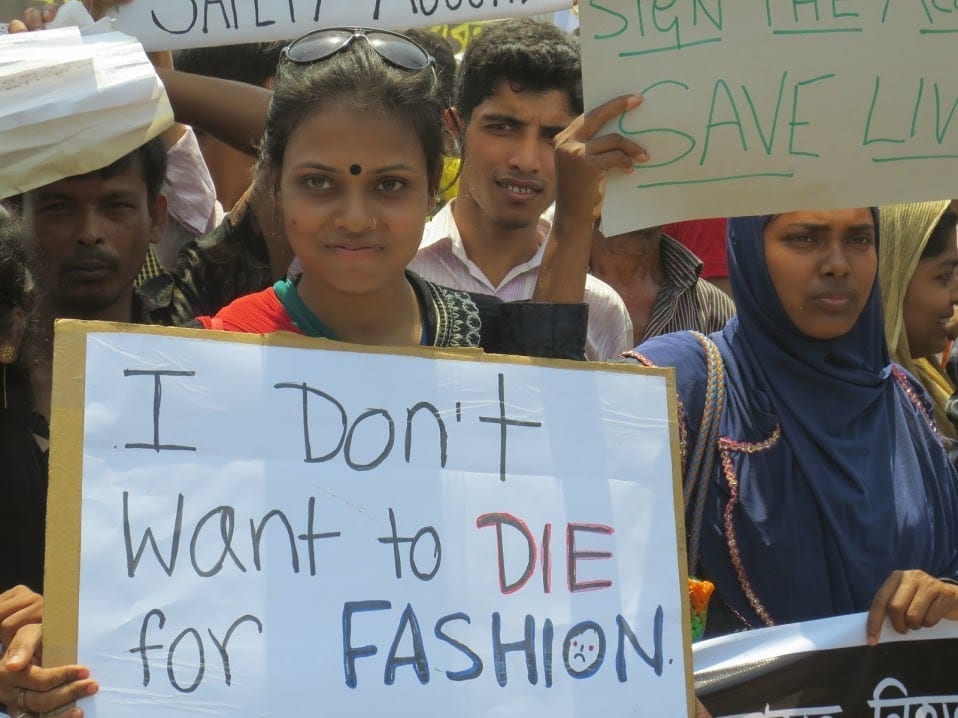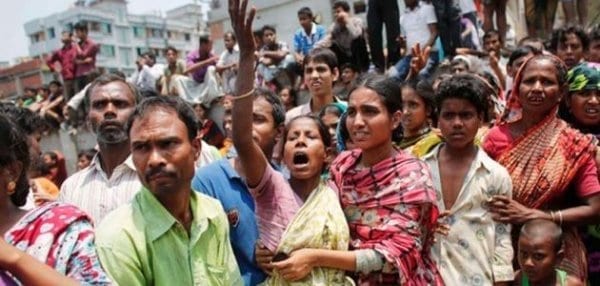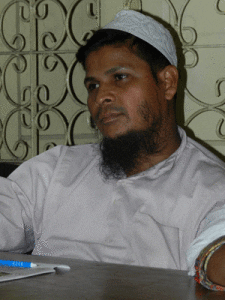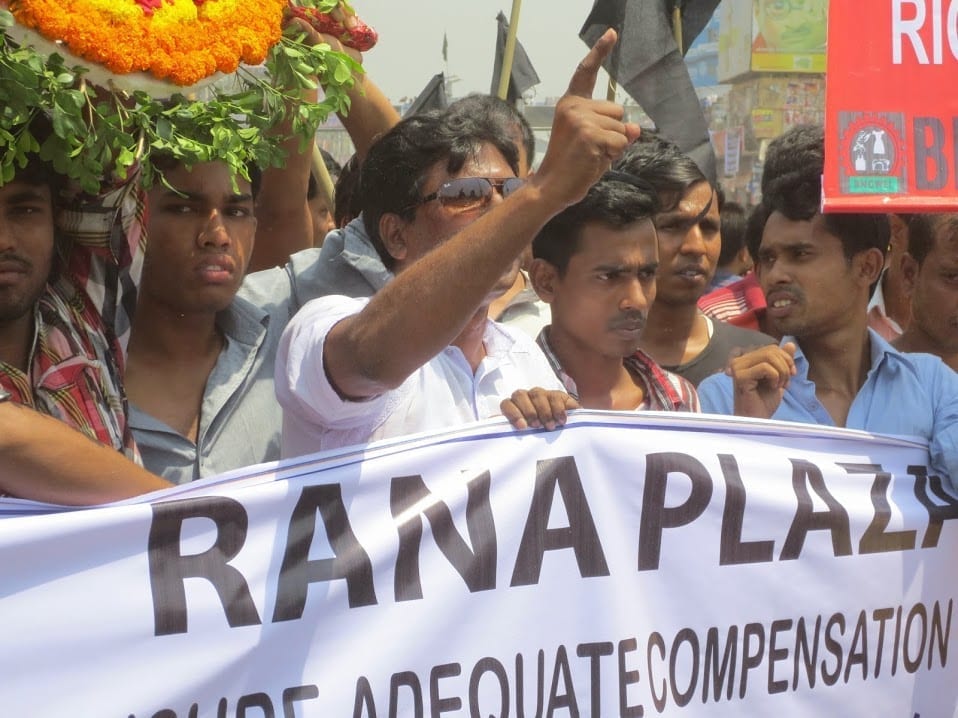
Apr 5, 2016
Four years after the tortured, lifeless body of Bangladesh garment worker organizer Aminul Islam was discovered in a ditch, his killers have yet to be arrested. Yesterday the Bangladesh Garment and Industrial Workers Federation (BGIWF) and Bangladesh Center for Workers Solidarity (BCWS) demanded that authorities find and bring Aminul’s killers to trial.
Aminul was a well-respected labor leader among workers at Savar- and Ashulia-area garment factories in suburban Dhaka, the capital. At the time of his death, he was a BCWS organizer and BGIWF regional president, and working to resolve a dispute between workers and managers at a nearby factory. The police filed a case accusing an agent of National Security Intelligence (NSI) with the crime, but he escaped. The BGIWF and BCWS, both Solidarity Center allies, complain that the case was filed without a proper investigation, and rules for collection of primary evidence were not followed.
At a Dhaka press conference yesterday, Babul Akter, BGIWF president, demanded that the Ministry of Home Affairs reopen the case and conduct a legitimate investigation, including DNA testing of Aminul’s clothes, to identify, arrest and prosecute the murderers.
Since Aminul’s murder, more than 1,100 Bangladeshi garment workers have been killed on the job and at least 3,600 have been injured, including workers in a factory fire at Tazreen Fashions in November 2012 and in the collapse of Rana Plaza in April 2013. Aminul sought to improve the hazardous conditions many garment workers still face, as well as to redress exploitation such as wage theft. He believed that the lack of fire safety measures and other protections for workers could most effectively be addressed by workers who freely form unions and collectively bargain to improve workplace conditions.
Balmi Chisim is based in the Solidarity Center’s office in Dhaka, Bangladesh.

Apr 6, 2015
Three years after the torture and murder of garment worker union leader Aminul Islam, his killers have not been brought to justice.

No one has been prosecuted for the torture and murder of garment worker union leader Aminul Islam.
The AFL-CIO and eight other global global labor rights organizations have written to Bangladesh Prime Minister Sheikh Hasina on the anniversary of his murder to demand his killers be located and prosecuted.
Aminul, 39, disappeared on April 4, 2012, and his body was found a few days later with signs of torture. He was a plant-level union leader at an export processing zone in Bangladesh, an organizer for the Bangladesh Center for Workers’ Solidarity (BCWS), and president of the Bangladesh Garment and Industrial Workers Federation’s (BGIWF) local committee in the Savar and Ashulia areas of Dhaka.
Despite international outcry, including a U.S. congressional hearing and then U.S. Secretary of State Hillary Clinton’s call for justice in the case, Aminul’s murder has gone unsolved. He had sought to improve the working conditions of some 8,000 garment workers employed by Shanta Group, a garment manufacturer based in Dhaka.
After the United States revoked preferential trade benefits for Bangladesh in 2013, citing human and labor rights abuses, the Bangladesh government dropped criminal charges against two garment worker leaders who worked with him, and announced it would step up the search for the people responsible for his torture and murder. Instead, the government dropped an investigation against a suspect and has taken no further steps to resolve the case.
“A sewing machine and a dozen colorful threads still give hope and strength to labor leader Aminul Islam’s family” but his widowed wife, Husne Ara, works around the clock to pay for food and school tuition for her children, writes the Bangladesh Daily Star.
Husne Ara said that Aminul could not speak over the phone because “he feared it was tapped.
“Even in the middle of the night, he received arbitrary phone calls from the intelligence,” she says.
Since Aminul’s murder, more than 1,200 garment workers were killed in the 2012 Tazreen factory fire and the 2013 collapse of Rana Plaza. After Rana Plaza, at least 44 workers have died in garment factory fire incidents in Bangladesh, and more than 900 people have been injured.
Aug 9, 2013
The Bangladesh government has re-registered the Bangladesh Center for Worker Solidarity (BCWS), a move that means the organization can fully function again and pursue its mission of educating workers about their rights.
The Bangladesh government revoked the organization’s registration in 2010 and arrested its leaders, Babul Akhter, Kalpona Akter and Aminul Islam, on criminal charges following protests by garment workers against unsafe working conditions and poverty-level wages. All three, who were held in custody and later released, say they were tortured in prison. In 2012, Aminul’s body was found dozens of miles from his home, severely beaten and tortured.
The government last month dropped charges against Babul and Kalpona and announced it would step up the search for the people who tortured and murdered Aminul. All these actions follow the decision by the U.S. government in June to suspend preferential trade benefits with Bangladesh because of chronic and severe labor rights violations. The Generalized System of Preferences (GSP) reduced tariff benefits agreement is worth $34.7 million a year for Bangladesh.
Despite international outcry, including a U.S. congressional hearing and then U.S. Secretary of State Hillary Clinton’s call for justice in the case, Aminul’s murder has gone unsolved. He had sought to improve the working conditions of some 8,000 garment workers employed by Shanta Group, a garment manufacturer based in Dhaka.
Since his murder, two massive garment factory disasters in Bangladesh have killed more than 1,000 workers, including the April building collapse of Rana Plaza, where 1,133 were killed. On Thursday, another garment worker Monwar Hossain, 22, died from his injuries at Rana Plaza. In the past eight months, there have been more than 40 fire and fire-related incidents at Bangladesh garment factories, according to data compiled by Solidarity Center staff in Dhaka, the capital.

Jun 28, 2013
Workers in Bangladesh—especially millions of poorly paid garment workers who often risk their lives in dangerous factories—won a new tool to advance their rights when the United States suspended preferential trade benefits with the country.
Yesterday’s announcement that the United States suspended its Generalized System of Preferences (GSP) agreement with Bangladesh based on chronic and severe labor rights violations “is a rare and clear statement that affirms that worker rights and livelihoods are not expendable,” says Solidarity Center Executive Director Shawna Bader-Blau.
Because the benefits are suspended and not terminated, Bangladesh has the opportunity to again qualify for the GSP benefit by improving worker rights, laws and practices. A key measure of that program will be whether newly registered unions will be allowed to represent worker interests.
“Since 2005, over 1,800 workers have died in preventable factory fires and building collapses in the Bangladesh garment industry,” says AFL-CIO President Richard Trumka. “Workers died because the government and industry violated safety standards to cut costs, while global apparel brands demanded production at the lowest prices in the world. Bangladesh’s workers, many of them young women, need good jobs with strong worker protections, a voice at work and safe work places.”
Many of Bangladesh’s 4 million garment workers risk their lives every day, working in thousands of unregulated and often poorly constructed factories. Yet despite their contribution to the $19 billion garment industry, they are denied workplace rights and toil in workplace conditions reminiscent of the U.S. sweatshops of 100 years ago.
“This long-awaited decision is an important step for workers’ rights,” says International Trade Union Confederation (ITUC) General Secretary Sharan Burrow. “It sends a strong statement to all governments and employers that violation of the fundamental rights of workers will not be tolerated if a country expects to participate in the global economy.”
Although the Bangladesh government has for years talked about improving the situation for workers, in the past 15 months:
• Aminul Islam, a labor leader, was killed and his murder has gone unsolved.
• The Rana Plaza collapse killed more than 1,127 garment workers in April.
• The November Tazreen Fashions fire killed at least 112 garment workers.
• More than 45 fire incidents have occurred at Bangladeshi garment factories since Tazreen, according to data compiled by Solidarity Center staff in Dhaka, the capital.
The ITUC and AFL-CIO are calling on the government of Bangladesh to act urgently and deliberately to ensure that the rights of workers are respected in law and in practice. Bangladesh unions and worker rights advocates from around the world also are calling on corporations throughout the supply chain to sign and implement a binding agreement regarding workplace fire and building safety in Bangladesh.
The proposed Fire and Building Safety Agreement, already accepted by more than 60 major brands, guarantees worker participation, recognizes the role of government and takes measures to combat corruption by requiring rigorous inspections, transparent reporting of audits and public oversight of results.
For more than 15 years, the Solidarity Center has supported worker rights in Bangladesh.
Oct 3, 2012
The murder earlier this year of a Bangladeshi union organizer is part of an escalation of attacks on the nation’s 4 million garment workers who seek to change abusive working conditions, says Kalpona Akter, executive director of the Bangladesh Center for Worker Solidarity (BCWS).
Akter, who just ended a visit to the United States sponsored by Vanderbilt University and the International Labor Rights Forum (ILTF), worked closely with her BCWS colleague and factory union organizer, Aminul Islam, who was murdered earlier this year, his body found beaten and tortured. Islam also was a leader of Bangladesh Garment and Industrial Workers Federation (BGIWF), As recently as mid-September, Bangladesh police fired rubber bullets and tear gas at tens of thousands of garment workers rallying outside factories in an industrial area near Dhaka.
The violence against workers seeking to improve their conditions and the murder of a union activist have made workers fear forming unions. Although workers are willing to walk out of a factory demanding improvements, they are afraid to join a union because that could make them a target for firing or worse, says Akter, whose organization is a close partner of the Solidarity Center.
“They see the face [of Aminul] when he was alive and see the face when he is dead, and they are afraid,” she says.
Representatives of the Bangladesh garment sector were among the 23-member delegation accompanying Prime Minister Sheikh Hasina, who attended the 67th United Nations General Assembly in New York. They are urging the United States to allow duty-free access of their products. Global labor rights activists say the Bangladeshi garment industry should not have such benefits until factory working conditions improve and violence against workers ends.
The violence against Bangladeshi workers has captured the attention of human rights activists and policymakers in the United States. It was the subject of a human rights hearing in Congress and Secretary of State Hillary Clinton, on a recent trip to Bangladesh, specifically addressed the unsolved murder of Aminul.
Bangladesh is now the world’s second-largest clothes exporter with overseas garment sales topping $19 billion last year, or 80 percent of total national exports. Yet the base pay for a garment worker in Bangladesh is the equivalent of $37 a month—the same monthly amount it costs to buy food for one person.
Garment workers also are subject to verbal and physical abuse, unrealistic production targets and working conditions that may provide 25 toilets for a factory with 5,000 employees, says Akter, who was joined by Babul Akhter, president of the Bangladesh Garments & Industrial Workers Federation (BGIWF). In 2010, two factory fires that year killed dozens of workers.
Akter, Akhter and Aminul were imprisoned in 2010 on false charges for trying to improve the working conditions of garment workers. While imprisoned, Akter says she was interrogated for long periods and Akhter was beaten.
Akter, who started working in garment factories years ago as a young girl, says that stopping the violence against workers will begin after the government finds and prosecutes those who murdered Islam.
Take action now: Urge Bangladesh Prime Minister Hasina to investigate Islam’s murder, ensure the safety of workers and drop charges against labor rights activists.
The Solidarity Center spoke to Kalpona Akter and Babul Akhter during their visit to Washington, D.C.




